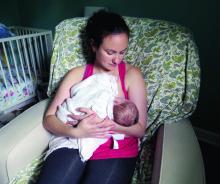Multiple studies have reported a link between breastfeeding and a reduced risk of ovarian cancer, but other studies have found no such link, and the evidence that the protective effects differ by histologic types has been inconclusive.
“This large study with extensive information on breastfeeding provides epidemiological evidence that breastfeeding, a potentially modifiable factor, may confer significant reduction in ovarian cancer risk, including high-grade serous, the deadliest subtype,” Ana Babic, PhD, of Dana-Farber Cancer Institute and Harvard Medical School, both in Boston, and colleagues reported in JAMA Oncology.
Dr. Babic led the study of a pooled analysis of women from 13 case-control studies participating in the Ovarian Cancer Association Consortium. The study evaluated 9,973 women who had ovarian cancer and 13,843 controls, with a mean age of 57 and 56 years, respectively. The data were collected over 20 years through December 2009. Dr. Babic and colleagues claimed that this is the largest study of breastfeeding and ovarian cancer risk to date.
Besides calculating a lower risk of invasive cancer, the analysis also determined that any breastfeeding was associated with a 28% lower risk of borderline cancers, compared with women who never breastfed. “Among invasive tumors, the association was statistically significant for high-grade serous, endometrioid and clear-cell tumors,” Dr. Babic and colleagues wrote, with 25%, 27% and 22% reduced risk, respectively. The researchers also noted a similar, although not statistically significant, reduced risk for low-grade serous tumors, but no such association for mucinous tumors. For borderline tumors, breastfeeding correlated with a 32% lower risk for mucinous tumors and 23% reduction in risk for serous tumors.
The analysis included five studies with data on exclusive breastfeeding. Women who breastfed exclusively for at least 3 months had a 19% reduced risk of ovarian cancer, compared with women who never breastfed, while women who breastfed albeit not exclusively for 3 months had a 30% reduced risk. The analysis also found an association between longer duration of breastfeeding and reduced risk of invasive ovarian cancer: less than 3 months duration per child was associated with an 18% lower risk, while more than 12 months was associated with a 34% lower risk (P < .001). Other factors that seemed to mitigate risk were older age when breastfeeding and breastfeeding within the previous 10 years.
One of the strengths of the studies is that it separated low-grade and the more common and deadly high-grade serous tumors. While the analysis found similar trends with endometrioid ovarian cancers, it didn’t reach a conclusion about other invasive histotypes because there were fewer cases to evaluate. Because the study population was predominantly white, the researchers acknowledged they could not sufficiently evaluate patterns among blacks, Asian, and other ethnic groups. “The association between breastfeeding and ovarian cancer needs to be investigated in large populations of other races and ethnicities,” Dr. Babic and colleagues added.
Nonetheless, they noted that their results support the World Health Organization recommendations of at least 6 months of exclusive breastfeeding and continued breastfeeding with complementary foods for 2 years or more, even though breastfeeding for less than 3 months is associated with a significant reduction in ovarian cancer risk.
The study is significant because of its “thoughtful approach to addressing potential confounders (parity, age, etc.),” said David Barrington, MD, gynecologic oncology fellow at Ohio State University James Cancer Center in Columbus.
“For general obstetricians and gynecologists, this study provides an additional reason to advocate for breastfeeding,” Dr. Barrington added. “This data should be included in a thorough discussion of the multitudes of benefits breastfeeding provides to both the infant and the mother.”
He added that future studies should evaluate breastfeeding and ovarian cancer risks in a more ethnically diverse population. “Understanding the potential impact of modifiable risk factors for ovarian cancer is paramount to overcoming racial disparities in outcomes,” Dr. Barrington said.
The study was supported by the U.S. National Cancer Institute. Dr. Babic reported grants from the U.S. National Institutes of Health. Some coauthors reported grants from the NIH, the National Health and Medical Research Council of Australia, the Federal Ministry of Education and Research of Germany, the Danish Cancer Society, or the Mermaid I Project. Some coauthors had no disclosures to report. Dr. Barrington has no relevant relationships to disclose.
SOURCE: Babic A et al. JAMA Oncology. 2020. doi: 10.1001/jamaoncol.2020.0421.



